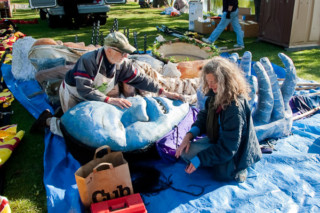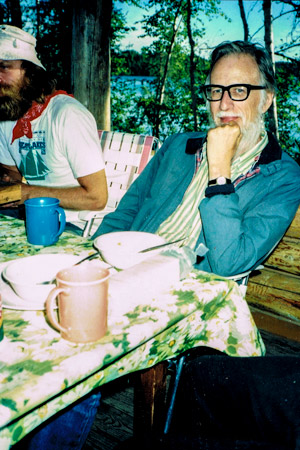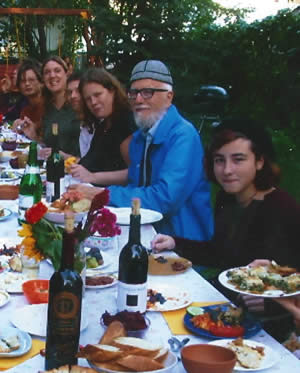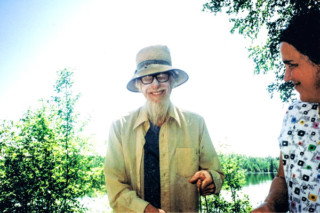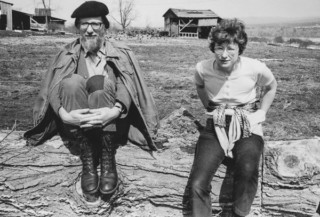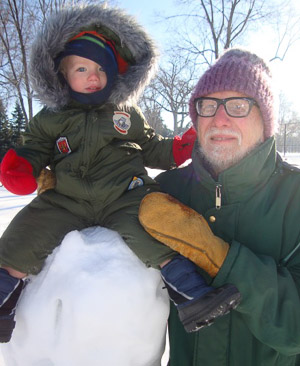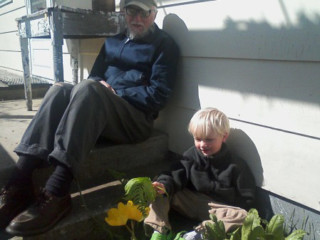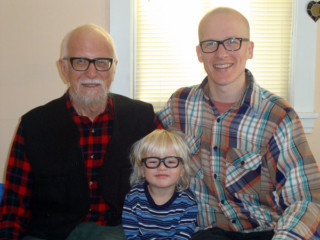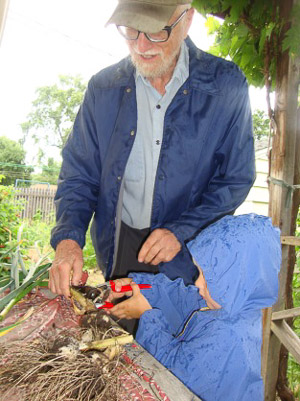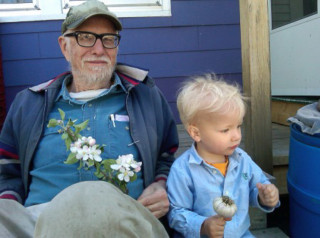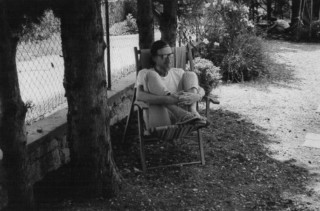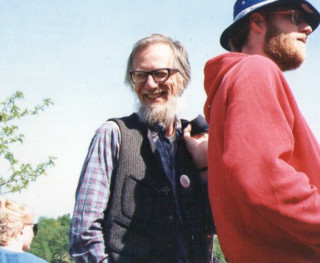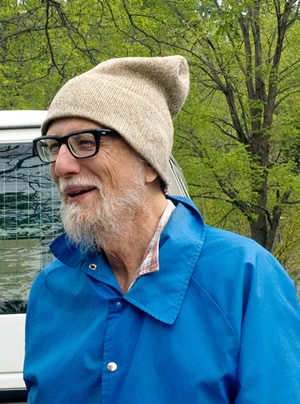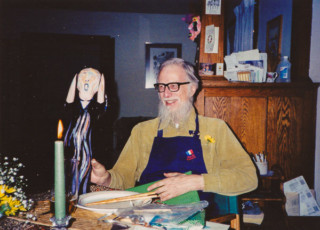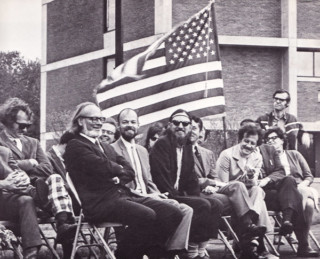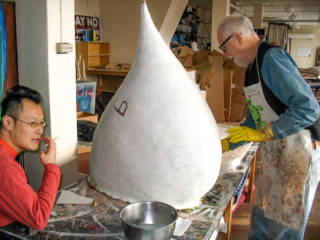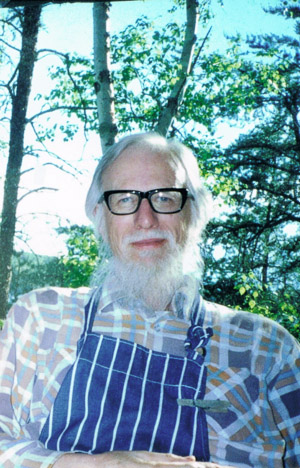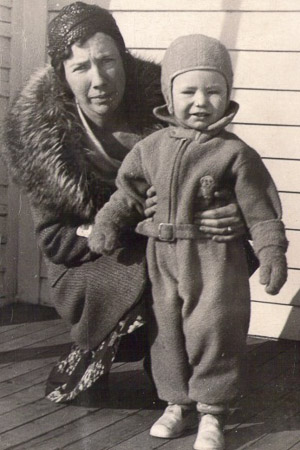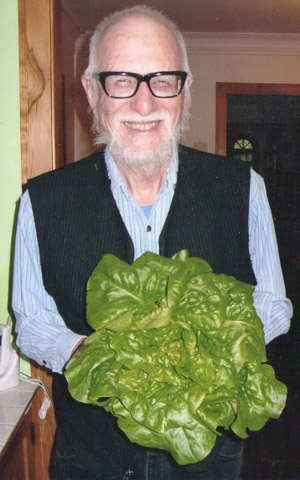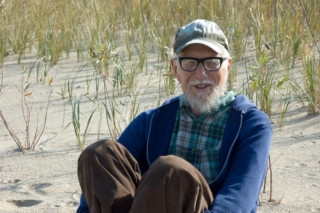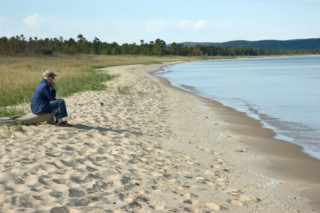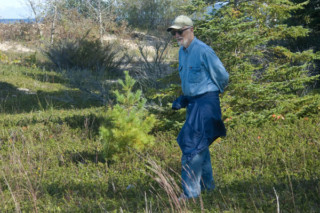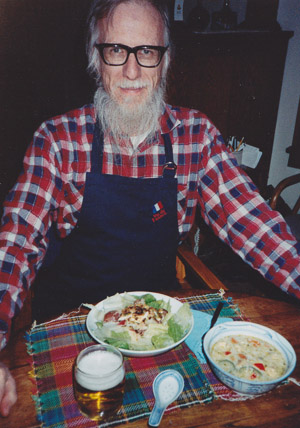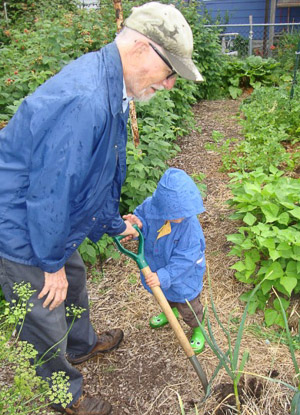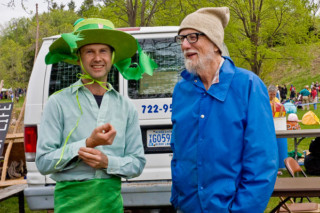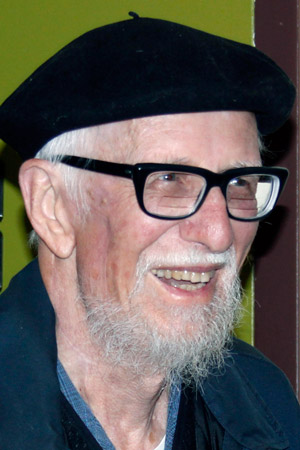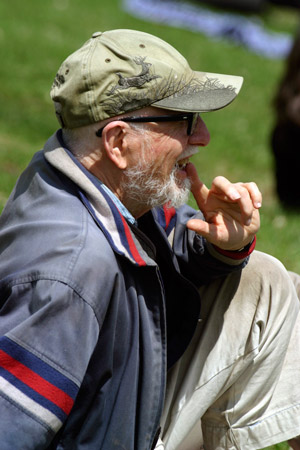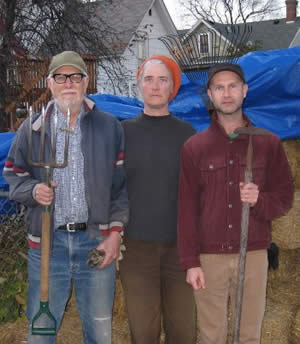James Henry Koplin was born January 27, 1933, in Vergas, MN, the only child of Emil F. Koplin and Dorathea (Schlicht) Koplin, and died December 15, 2012, in Minneapolis, MN, after a short struggle with pneumonia.
After graduating from high school in Lake Park, MN, Jim attended the University of North Dakota in Grand Forks for one year before transferring to the University of Minnesota in Minneapolis. After completing a BA in psychology in 1955, he served in the U.S. Army from 1955-57 and returned to the University of Minnesota to complete a Ph.D. in psychology in 1962.
During his graduate studies he met fellow graduate student Sally Katz, and they married in 1959. They divorced but remained close friends until Sally’s death in a bicycle accident in 2000.
Jim began his teaching career at Vanderbilt University in Nashville, TN, in 1962 and then was a founding faculty member at the new Hampshire College in Amherst, MA, in 1970. After retiring from teaching, he moved to Fort Wayne, IN, in 1980, where he helped establish the Center for Nonviolence.
In 1982 he moved back to Minneapolis, where he volunteered for a number of community organizations dedicated to social justice and ecological sustainability, including Northern Sun Alliance, Organizing Against Pornography, the Heart of the Beast Puppet and Mask Theatre, and the Land Stewardship Project. And, perhaps most central in his life, he was an extremely skilled farmer-gardener.
Jim brought to all of these endeavors a keen intellect, wide-ranging practical skills, a much-respected work ethic, and a deep capacity for love. His many former students, comrades, and friends will continue to remember Jim and the model he offered for living with integrity on “the human estate of grief and joy.”
Plain Radical: Living, Loving, and Learning to Leave the Planet Gracefully
by Robert Jensen · Counterpoint/Soft Skull, fall 2015
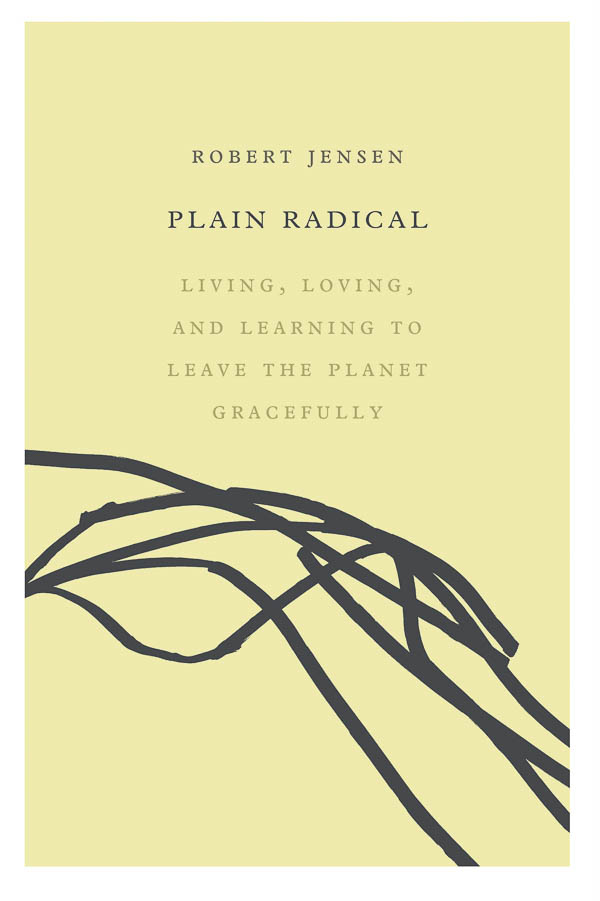 There was nothing out of the ordinary about Jim Koplin. He was just your typical central Minnesota gay farm boy with a Ph.D. in experimental psychology who developed anarchist-influenced radical-feminist and anti-imperialist politics, and got involved in every major progressive movement of the last half of the 20th century while never losing touch with his rural roots. But perhaps the most important thing about Jim is that throughout his life, almost literally to his dying breath, he spent some part of every day on the most important work we have: Tending the garden.
There was nothing out of the ordinary about Jim Koplin. He was just your typical central Minnesota gay farm boy with a Ph.D. in experimental psychology who developed anarchist-influenced radical-feminist and anti-imperialist politics, and got involved in every major progressive movement of the last half of the 20th century while never losing touch with his rural roots. But perhaps the most important thing about Jim is that throughout his life, almost literally to his dying breath, he spent some part of every day on the most important work we have: Tending the garden.
Plain Radical is a touching homage to a close friend and mentor, taken too soon. But it is also an exploration of the ways in which an intensely local focus paired with a fierce intelligence can provide a deep, meaningful, even radical engagement with the world. “Jim was the most plainly radical person I have ever known” says Jensen. “Radical in the sense of going deep, to the root, to analyze the world and its problems without fudging the facts or hedging one’s bets. Plain, both in the sense that Jim’s analysis was unvarnished and unadulterated, and because in day-to-day life he avoided anything fancy or faddish.
Drawing on first-hand stories and accounts as well as the nearly 3,000 pages of correspondence that flowed between the two men between 1988 and 2012, this book is about the intersection of two biographies and the ideas two men constructed together. It is in part a love story, part intellectual memoir, and part a political polemic—an argument for how we should understand problems and think about solutions—in those cases when solutions are possible—to create a decent human future, if there is to be a human future at all.
Available now: Plain Radical: Living, Loving, and Learning to Leave the Planet Gracefully
By Robert Jensen · Published June 13, 2014 at wagingnonviolence.org
Every time I read the latest bad-and-getting-worse news about the health of the ecosphere, such as last month’s report that the melting of some giant glaciers had passed the point of no return, I think back to a conversation 25 years ago that helps me put such news in perspective. In a Minneapolis bakery where my new friend Jim Koplin and I had settled into a Friday morning coffee session to analyze the world, and gossip a bit, Koplin told me that he thought the most important task for human beings — as a species, not just as individuals — was “learning to leave the planet gracefully.”
At our regular table by the window, he said this matter-of-factly, not joking but also not overly dramatic about it. This was a judgment he felt obligated to share with me once our friendship had deepened, our conversations had gotten sufficiently serious, and he had determined that I could handle it.
Why would human beings need to learn to leave the planet gracefully? The answer — so painfully obvious today, as the evidence about ecological crises piles up, readily available to anyone who chooses to know — was clear to Koplin more than 25 years ago.
Although he wasn’t prone to quoting scripture, I am, so let me offer a “why” in the words of Jeremiah from the Hebrew Bible:
“The harvest is past, the summer is ended, and we are not saved.” (Jeremiah 8:20)
The days of plenty are over, the high-energy phase of human life is coming to a close, and we have not yet learned all that we need to know — about ourselves or the world — to adapt to a new era.
Does this seem overly dramatic to you? Take a look at any measure of the health of the ecosphere that makes our lives possible — the data about the intensifying negative effects of human activity on the water, soil and climate of the planet — and an unpleasant fact is unavoidable: An ongoing large-scale human presence on the planet is impossible if we accept the assumptions, and give in to the demands, of existing social and economic systems. Put bluntly: Contemporary America’s conception of “the good life” is inconsistent with life. And today no serious political force is acknowledging that hard truth, let alone thinking about the implications, let alone offering meaningful policy proposals, let alone taking action.
As a people, we have yet to muster the intellectual resources, political will and moral courage needed to save ourselves and minimize the long-term damage to other living things.
If that seems too much to bear, that’s because it is. Yet, that is our challenge: to face what is beyond our capacity to bear and refuse to turn away from the demands that these crises place on us. My friend Jim Koplin was one of the few people I’ve known to meet this challenge head on. What’s more, he was able to bear that truth without giving into despair or giving up his work, always remaining part of a loving community.
A Depression-era Minnesota farm kid, Koplin’s childhood involved a lot of work on that farm and a lot of time in the surrounding woods and lakes, experiences that shaped his appreciation of the beauty of the world and hard-working commitment to careful stewardship of the land. He also learned hard lessons about patriarchy from an abusive, violent alcoholic father, and he understood what it was like to be an outsider as a gay boy.
Koplin left the farm for college, eventually earning a Ph.D. in psychology. In his first teaching job at Vanderbilt University in Nashville, Tenn., the direction of his life changed through his involvement in the civil rights movement, where he learned that people in positions of privilege (whether because of race, gender, sexual orientation, class or nation) are not simply being noble when they commit to radical movements that work against that privilege, but are saving our own lives.
Koplin retired early, living frugally on savings without paid employment, devoting himself to independent study, political organizing, and community building in a variety of left, feminist and environmental movements. Just as important as his political activity, he was an extremely skilled farmer-gardener who worked whatever land was available to him, building his daily routine around the hard but pleasurable work of growing food without chemicals, sharing that work and its bounty with neighbors, alongside young people who could learn from him.
In the 24 years I shared with Jim Koplin, who died in 2012 at the age of 79, I learned much from him, and we learned much together. One of the most important lessons was that social justice and ecological sustainability are not competing values but components of the same project of challenging hierarchies and the domination/subordination logic on which they are built. Those hierarchies within the human family undermine the possibility of decent communities that respect individual autonomy; justice and hierarchy are incompatible. Human claims to dominate the larger living world undermine the possibility of an ongoing human presence on the planet; sustainability and hierarchy are incompatible. This framework went on to shape some of his most enduring ecological lessons.
First, and most basic, specific places and the whole planet both have to matter to us. For Koplin the phrase “think globally, act locally” was too simplistic; we should think and act locally and globally, depending on the situation and the demands of the historical moment.
Koplin spent a lot of time studying both the human and non-human inhabitants of his place, where he lived, so that he could act responsibly there. As a farmer-gardener, he was especially attentive to the soil and creatures, both those that aided soil fertility and those that stole his produce (many of the urban squirrels that ventured into his garden paid a high price). But he understood “place” to be the whole place, including the trash-strewn sidewalk in front of the puppet theater where he volunteered so many hours. Usually the first person there in the morning (Koplin kept farm hours most of his life), he did what he could to nurture whatever beauty could be created in the concrete.
Attending to our local places, however, is only part of our obligation. Being a good steward of one’s own land doesn’t magically protect that land from the effects of global warming and rapid climate destabilization. And even if we could protect our individual places in the United States, we live in an economy that is based on the destruction of places all over world. We can’t, and shouldn’t try to, escape our global obligations to curb that exploitation.
Second, personal habits and social systems both matter. Koplin believed in personal responsibility but had no illusions that individual changes in behavior was adequate.
He took the slogan “reduce, reuse, recycle” more seriously than anyone I have ever known. Like many who grew up in a world of scarcity, he was relentlessly frugal to the end of his life, even when he had adequate savings and a pension to live more affluently. Koplin believed that we reveal ourselves through our habits, and he cultivated habits of care and thrift, which he saw as an expression of respect for the world.
But he rejected the claim that one’s obligations could be met just by being frugal and living simply and never suggested he was morally superior for not participating in the consumer feeding frenzy all around him. Koplin never stopped challenging the perverse values of that culture through political activity, recognizing that the problem is not how any particular individual behaves in capitalism but capitalism’s logic of endless growth and the mindless consumption that it generates.
Third, science and folk knowledge both matter. Koplin valued modern science’s ability to expand our understanding of the world, but he believed that this understanding is complementary to, not at odds with, what ordinary people know about the world through experience.
He was a voracious reader of scientific work, ranging from technical work in fields in which he had some expertise to popular accounts on virtually any subject. As a former academic psychologist interested in language acquisition who had once taught research methods and statistics, he had a deep respect for the scientific method and understood the need for the rigor that came with specialization, along with the need for sharp criticism of lazy thinking and sloppy research.
However, Koplin also understood the limits of science. Although he had no formal training in ecology, he had an ecologist’s awareness that science could never identify, let alone understand, all of the complex connections and interactions in our bodies or in the world — all of which argues for considerable humility in rushing to “scientific” answers to all questions. He knew that traditional cultures acquired and passed along knowledge in non-scientific ways; he spoke lovingly of what he had learned from his grandmother in her garden, complex knowledge that was passed down in complex ways that engaged the mind, body and emotions. He admired a former student’s advanced research on the human visual system in the lab but spoke just as respectfully of a childhood friend’s skill at butchering a deer shot in the nearby woods.
Finally, Koplin understood that like every other organism on the planet, human beings live within limits — the limits of the organism and of the systems in which an organism is embedded. Contemporary society is based on a collective denial of those limits, a delusion made possible temporarily by the reigning fundamentalist faith of our day, technological fundamentalism — the belief that the increasing use of evermore sophisticated high-energy, advanced technology can solve any problem, including the problems caused by the unintended consequences of such technology. Koplin, earlier than anyone I knew, had come to understand that this fundamentalism — seeing computer chips and machines as our savior — was far more dangerous than even the craziest claims about saviors in the sky.
His analysis of the prospects for that decent human future began with the ecological realities, followed by an evaluation of the ability of our social/political/economic systems to adapt to those realities. Koplin’s blunt assessment: The forces set in motion by human “civilization” — beginning with the agricultural revolution 10,000 years ago and dramatically intensified in the fossil-fuel epoch of the industrial revolution — have degraded the planet’s ecosystems in ways that cannot be reversed, that we are past the point of no return on many crucial markers. That means dramatic changes are required, not just in our “lifestyles” and not just in social/economic/political systems, but in how we understand ourselves at the most basic level, how we answer the question, “What does it mean to be human?”
I am convinced that how we define being human in a future of global instability depends very much on how honest we can be with each other, and with ourselves, in the present.
Mainstream environmental groups — in fact, mainstream groups of any kind — avoid these questions, but that doesn’t mean people aren’t struggling with those realities and assessments, typically alone or in small groups. Koplin saw no evidence that any society was ready to engage in the necessary discussions or consider the necessary changes, least of all the United States, which was not an easy conclusion for him to reach because he loved so deeply. All of his friends experienced that love with him, and watched him love the living world with a reverence that led one of those friends to describe him as a “nature mystic.”
That’s why Koplin thought our task was to leave the planet gracefully, because he loved us and loved the world that is our home. He loved people and planet in a way that made him yearn for a graceful, peaceful ending, much as one wishes for a graceful and peaceful ending for a person coming to the end of an individual life.
But Koplin also knew that such an elegant ending was unlikely, which is why he also told his closest friends: “I wake up every morning in a state of profound grief.” Again, he was not a scripture-quoting fellow, but again the words of Jeremiah echo: “My grief is beyond healing, my heart is sick within me.” (Jeremiah 8:18)
Just as his comment about leaving the planet wasn’t flippant, neither was his description of his grief. Koplin was not a demonstrative person emotionally, and many who knew him superficially might even say he could be standoffish and aloof. But that was because he felt deeply and was aware of how easily those feelings could overwhelm him. So, he was careful in public.
In another of our early morning coffee sessions, Koplin told me that he remembered the moment as a young person when he realized that every human being’s brain worked the same way, which meant that every human being alive on the planet had the capacity to experience exactly the same range of emotions as he did. It was at that moment that the abstract idea of equality became real to him — we really are all the same, at the deepest and most basic level — and that the suffering of people everywhere became real, and overwhelming, to him. Koplin said that daily life was manageable because he had found ways to wall himself off from that realization, for to try to live with that awareness always present would be to court suicide.
As difficult as these feelings were for him, Koplin knew that our only real basis for hope comes in the embrace of this grief. Not an abstract hope that somehow, magically, everything will turn out OK, but the hope that we can speak honestly with others and form the small groups and communities that can foster the radical analysis of hierarchies and illegitimate authority, along with the traditional values of frugality and mutual obligation. This is what
I call being a “plain radical,” and Koplin was the most plainly radical person I have ever known.
I don’t want to romanticize my friend. While his political vision and ecological understanding were incisive, his ideas were not unique. But in my experience, it is rare to find one person who follows both lines of thought so deeply and lives the ideas with such forbearance and equanimity. He romanticized neither revolutionary politics nor rural life, but rather drew the best from each tradition and constructed a political and ecological life that made sense for him. Rather than seek converts to his particular style of living, he embraced life in a diverse community and offered his attention and affection to a wide variety of people. Koplin didn’t make many demands on others. Instead, the dignified way he led his life led those of us who loved him to make demands on ourselves. By never exempting himself from the obligation to critically self-reflect, he made it hard for us to wiggle out of it.
When I speak of these struggles, people invariably call me “a downer” and “too negative.” I used to believe that was true, that I was being depressing by pushing these issues, but I have come to see that claim inverts reality. In fact, I’m the positive one — by placing my faith in our collective ability to bear the truth that is beyond bearing, I am affirming the best aspects of our humanity, just like my friend Jim Koplin. Those who demand that we ignore the painful questions are, in fact, the downers — the people stuck in negativity, the ones who have no faith in themselves or others to face reality honestly.
Without that commitment to facing reality honestly, the harvest will have past, the summer will have ended forever, and we will not be able to save ourselves.
This is an edited version of a lecture delivered June 3, 2014, at the University of Texas at Austin in the Informal Classes program. Video is online here. For a text of the complete lecture, email [email protected].
Robert Jensen is a professor in the School of Journalism at the University of Texas at Austin and board member of the Third Coast Activist Resource Center in Austin. His latest books are Arguing for Our Lives: A User’s Guide to Constructive Dialogue, and We Are All Apocalyptic Now: On the Responsibilities of Teaching, Preaching, Reporting, Writing, and Speaking Out. Jensen is also the author of All My Bones Shake: Seeking a Progressive Path to the Prophetic Voice; Getting Off: Pornography and the End of Masculinity; The Heart of Whiteness: Confronting Race, Racism and White Privilege; Citizens of the Empire: The Struggle to Claim Our Humanity; and Writing Dissent: Taking Radical Ideas from the Margins to the Mainstream. Jensen can be reached at [email protected] and his articles can be found online at robertwjensen.org. Join an email list to receive articles by Jensen here. Twitter: @jensenrobertw.
by Robert Jensen
“Good teaching is living your life honestly in front of students.”
I don’t recall exactly when Jim Koplin first told me that, but I know that he had to say it several times before I began to understand what he meant. Koplin was that kind of teacher—always honing in on simple, but profound, truths; fond of nudging through aphorisms that required time to understand their full depth; always aware of the connection between epistemology and ethics; and patient with slow learners.
But, I’m getting ahead of myself. Some background: Jim Koplin was, by way of a formal introduction, Dr. James H. Koplin, granted a Ph.D. in psychology from the University of Minnesota in 1962 with a specialization in language acquisition, tenured at Vanderbilt University and later a founding faculty member of Hampshire College, retired early in 1980 to a rich life of community building and political organizing. I never took a class from him, though in some sense the 24 years I knew him constituted one long independent study. That finally ended on December 15, 2012, not upon satisfactory completion of the course but when Jim died at the age of 79. He left behind a rich and diverse collection of friends, all of whom have a special connection with him. But I hang onto the conceit that I am his intellectual heir, the one who most directly continued his work in the classroom.
So, with that conceit firmly in place and his death fresh in my mind, it seems proper and fitting that I offer lessons learned from Koplin to the world outside his circle of students and friends.
I’ve spent a considerable amount of time in my 20 years of teaching at the University of Texas at Austin reflecting on Jim’s core insight, that good teaching is living your life honestly in front of students. The first, and most obvious, implication is a rejection of the illusory neutrality that some professors claim. From the framing of a course, to the choice of topics for inclusion on the syllabus, to the selection of readings, to the particular way we talk about ideas—teaching in the social sciences and humanities is political, through and through. Political, in this sense, does not mean partisan advocacy of a particular politician, party, or program, but rather recognizing the need to assess where real power lies, analyze how that power operates in any given society, and acknowledge the effect of that power on what counts as knowledge.
Every professor’s “politics” in this sense has considerable influence on his/her teaching, and I believe it is my obligation to make clear to students the political judgments behind my decisions. The objective is not to strong-arm students into agreement, but to explain those choices and defend them when challenged by students. At the end of a successful semester, students should be able to identify my assumptions, critique them, and be clearer about their own.
I would recommend this approach for all faculty members, but it has been particularly important for me because I am politically active in fairly public ways, which students often learn about through mass media and the internet. To make clear the difference between the goals of Jensen-in-the-classroom (encouraging critical thinking) and Jensen-in-public (advocating political positions), I have taken extra care to be transparent in front of students. This also was a product of my time with Jim, who insisted that if intellectual inquiry led one to conclusions about what is needed to advance social justice and ecological sustainability, then one should contribute to those projects. Jim’s life offered me a model for how intellectual work need not be separated from community and political work. In one of my early conversations with Jim about this balance, he referred me to one of his elders, Scott Nearing, who said that three simple principles guided his life: the quest “to learn the truth, to teach the truth, and to help build the truth into the life of the community.” Each of those endeavors feeds the other two; scholarship, teaching, and community engagement are a package deal for me. But Jim always reminded me that what one does in front of students is not the same as what one does in front of a crowd at a rally, or in an organizing meeting.
Perhaps Jim’s most important contribution to my development as a teacher came in his advocacy of interdisciplinary undergraduate education. In the contemporary academy, the reward system and culture tend to push professors toward intellectual specialization over the big picture, and toward working with graduate students over undergraduate teaching. In my connection with Jim, I saw the importance of—and joy in—a truly interdisciplinary approach to knowledge that took as its primary task teaching at the most basic levels.
The first course I taught in the university-wide program called First-Year Seminars, “The Ethics and Politics of Everyday Life,” was straight out of Koplin: I had students read five books that touched on the political, economic, and ecological implications of our choices in our daily lives. Every time I worried that I would be pushing students too far, Jim would tell me that the students were hungry for honest, jargon-free radical talk, and he was right.
I devised my current interdisciplinary course, “Freedom: Philosophy, History, Law,” in conversation with Jim. As it came into focus, I told Jim that I wanted the course to not only challenge the culture’s simplistic definition of freedom but to undermine the confidence of anyone who thinks the term can be easily defined. On the first day of class, I tell students that the minute they think they have nailed down a definitive definition of freedom, some new experience will force them to modify that. It is the struggle to understand the concept that matters, and I am just another person struggling with them, albeit with the advantage of more extensive reading and experience.
That reflects another of Jim’s other lessons, the understanding that a good teacher learns alongside students. That doesn’t mean pretending that students have as much to teach me as I have to teach them (if that were the case, why am I the one getting paid?); the excitement comes from genuinely being open to that discovery with students. As a teacher, I shape—but cannot control—the experience. There’s always a certain kind of thrill in that process, especially in front of a class of 300. There are days when I feel a bit like I am doing an intellectual high-wire act. Those tend to be my favorite classes.
That thrill is rooted in another Koplin lesson: Good teaching is based in recognizing our intellectual limits, our ignorance. By that, he did not just mean that any single teacher can’t know everything. Instead, Jim meant that we humans are always more ignorant than knowledgeable, that even in fields in which we have dramatically deepened our understanding of the world, there is—and always will be—far more that we do not know than we do know. I have come to realize that the longer I teach, the more I know and the less certain I am about what I know. The more aware I am of the limits of my knowledge, the better teacher I become.
Jim also believed that all teaching required an appreciation of the arts, and he taught me to look for wisdom in poetry. To the best of my knowledge, Jim never wrote a line of poetry in his life, but that made him only more appreciative of the form. I cannot remember if I shared this poem with him or vice versa; at some point, as it is with a good teacher, the flow of information and insight was two-way and impossible to track. Whomever it came from first, Jim and I came across the poem “Dropping Keys” by Hafiz, the 14th century Sufi poet from Persia.
The small person
Builds cages for everyone
She
Sees.
Instead, the sage,
Who needs to duck her head,
When the moon is low,
Can be found dropping keys, all night long
For the beautiful,
Rowdy,
Prisoners.
For too many students, education too often feels like a cage. If we aren’t careful, we teachers can find ourselves building cages, guarding cages, and then locking ourselves inside those cages.
Jim Koplin never stopped dropping keys for me. To honor his memory, I will try to do the same for my students.
